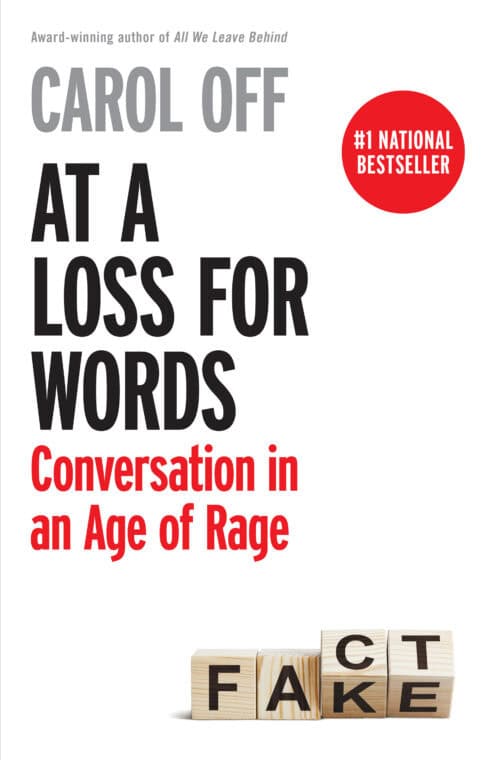In her latest book, Carol Off takes on those who have contorted words for their own design in this era of political battle in which a precise vocabulary is needed more than ever. “We haven’t lost the war for humanity,” she writes. “We want to get along, and we work better when we work together.”
Welcome to election year 2025 in Canada. All that is left to do is to determine the timing, cue the vitriol, and turn the demeaning, demonizing language up to 11.
Our politics – and those south of the border – already stew in a bowl of intemperate language, words that have had their meanings subverted or hijacked and charges and counter charges untethered to facts. It’s the type of language that author and broadcaster Carol Off heard more and more frequently as she interviewed newsmakers on CBC’s As It Happens, the radio current-affairs program she co-hosted for almost 16 years. During that time, her producers had always been able to find reasonable voices willing to debate rationally from radically different political ramparts. Until they couldn’t. Her guests, she says, became angrier, more irrational and accusatory while debating political rivals whom they no longer merely disagreed with but appeared to hate.

“In all my years of journalism, I had never encountered anything like it,” she writes in At a Loss for Words: Conversation in an Age of Rage. In her book, Off takes on those who have contorted words for their own design in this era of political battle in which a precise vocabulary is needed more than ever if we are to rise above the yelling.
She trenchantly – and sometimes humorously – examines six words, in six chapters, that she believes are in danger of losing meanings that have been well-earned and hard fought: “Freedom,” “Democracy,” “Truth,” “Woke,” “Choice,” and “Taxes.”
We live in the time of the ‘power lie.’
Carol Off, author and broadcaster
She explores the use of dark money in American politics, the hard-right view that democracy is not something that should be made available to all, the rejection of reproductive choice for women by the highest court in the United States, and a political landscape in which those seeking office convince voters that “up is down, in is out and two plus two equals five.” We live in the time of the “power lie,” Off asserts, in which something that is known to be untrue is repeated so often that it takes on a power of its own, the power to “flummox the people you loathe – the journalists, the liberals, the other. Joining force against a shared and easily demonized enemy is a pillar of autocracy.”
Donald Trump and Pierre Poilievre, and their brand of populism, are featured in Off’s book. But since At a Loss for Words was published, Trump has again been elected and is threatening the Canadian economy and our sovereignty, and The Philanthropist spoke to Off on the day of Chrystia Freeland’s stunning resignation as Justin Trudeau’s finance minister, a development that led to the prime minister’s resignation and appeared to make a Poilievre government in 2025 likelier than ever.
We may be losing a battle, but it’s not the end of the war. These things ebb and flow.
Carol Off
So, have we already lost the battle over the perversion of our language in the name of political warfare? “We may be losing a battle, but it’s not the end of the war. These things ebb and flow,” Off maintains. But there is no doubt that the pendulum has swung dangerously in the wrong direction. We have entered an era of potential chaos – at best, uncertainty – in which a Trump administration will require the complete attention of whomever becomes prime minister later this year. Navigating this political minefield and getting the government’s attention will be a challenge for all sectors, including non-profits and charities.
Off now finds herself having discussions with friends and associates she had thought were progressive who are now musing about taking some time to see how Trump governs or suggesting that perhaps Poilievre won’t be so bad.
Although the amount of dark money slogging around in the US political system makes comparisons limited, there is no doubt that what is happening south of us has an influence here, Off says.
How did we get here? Off says that Trump had begun the era of fake news and the bully lie with his 2016 election but that rationality really fell to the wayside during the pandemic, when we no longer knew what or whom to believe. “For more than two years, you had to trust government with everything,” she says. “But you couldn’t see your family. You couldn’t have your family over. You couldn’t hold the hand of your loved one as he or she died. You couldn’t go out without a mask. You couldn’t go to work. Your kids couldn’t go to school. At the same time, science was saying, ‘We think we know what this is, but we’re still not sure. It might be airborne, it might not.’ The amount of fear that was created . . .”
Canadians largely did what their government told them, and COVID deaths here were a fraction of the number of deaths in other countries, particularly the United States. But by the time the so-called convoyistas took over the streets of the capital with their honking horns, idling rigs, and bouncy castles, they were shouting the anger felt by many Canadians. And, as Off points out, every time a camera was turned on, they shouted for their freedom, oblivious to the fact that only in a free country could you drive 16-wheelers to the steps of Parliament.
The Trudeau government handled the pandemic crisis well – on paper – Off says, but she adds that its response was technocratic and “heartless.”
“It left a residue,” she says. “People believed that the government didn’t understand what we were going through.” Poilievre has skilfully exploited this resentment and distrust of government institutions and expertise and would form a majority government if an election were held today, pollsters tell us.
The “freedom” call grows loudest from those who believe their place in society is slipping, Off writes, and their definition of freedom means they are liberated from responsibilities to strangers or the constraints of government. We see what this culture of rage brings: “Pick-up trucks roar around our communities emblazoned with messages of hate and rancour; women, Jews and Muslims report incidents, small and large, of open hostility on our streets; queer and transgender people watch their backs,” she writes.
Trump has already done untold damage to the mainstream US media with his “fake news” lies, branding the media an enemy of the people and even backing violence against reporters. Since his November election, the president-elect has started to use the courts against the media, having already won one lawsuit against ABC News. He is suing CBS News, the Pulitzer Prize board, and the Des Moines Register in Iowa, and he has filed an Election Commission complaint against The Washington Post.
Demagoguery is extremely powerful and effective. It is much more effective because social media likes it.
Carol Off
Poilievre also casts the media as enemies, dismissing his media interlocutors, accusing them of being Liberal lackeys shilling for Trudeau and lecturing them on the quality of their questions. Off has no doubt he will dismantle the CBC and leave other media to the vagaries of the market without any government help. He knows, she writes, that he must diminish the influence of independent media. She reminds readers of the infamous “apple interview,” in which Poilievre munches on an apple as he responds to questions from a reporter in British Columbia’s Okanagan Valley with smirks, condescension, and hostility, posting the video of the encounter on social media, played, in Off’s mind, as “revenge porn.”
“Demagoguery is extremely powerful and effective,” she says. “It is much more effective because social media likes it. They are bosom buddies. This us-versus-them scenario that demagoguery plays with is also the most lucrative narrative for social media.” Those who seek to divide and drive wedges and search for demons and the “enemy within” are made for social media because that is precisely how social media thrives, she says.
The demonizing of the opponent, which is so key to populism, will ratchet up during the coming Canadian campaign. Off fears the demonizing of immigrants for political reasons here, just as Trump played to the fears of an invasion of the “other,” baselessly claiming they had come from countries that had opened their prisons or insane asylums and sent those people to America. She worries we will go down a similar path, particularly if hordes of immigrants are at our gates, seeking to flee Trump’s plans for mass deportation.
Poilievre speaks of the shadowy gatekeepers, the globalists, and the woke mobs, attacking at every turn and continually telling us that everything is broken. That has had a grave effect on this country. The Angus Reid Institute, in a December 2024 poll, found that only 34% of us were “very proud” to be Canadian. When it asked the question in 2016, 52% said they were very proud. When it asked the question in 1985, 78% were very proud. Although the numbers have declined during the Trudeau years, Poilievre’s dark view of this country has helped hasten the decline.
“He’s a divisive person,” Off says of Poilievre. “So is Trump. Trump is an agent of chaos. Poilievre has always been about division and rancour. It doesn’t matter what you say to him; you could ask him what he had for breakfast and he’d just as soon punch you in the nose. That’s how he rolls. People will get tired of it, but he will be in government before they realize what they’ve got.”
We haven’t lost the war for humanity. We haven’t lost the war of caring about each other.
Carol Off
Still, Off refuses to believe we have lost this war, even if she sounds a bit Pollyannaish. “We haven’t lost the war for humanity,” she says. “We haven’t lost the war of caring about each other. I do think we are social animals, and we want to get along, and we work better when we work together. We don’t want to hate each other. We don’t want to feel anger. We want to sit down with our families and talk, even if we feel we have lost them because they’ve gone down some QAnon rabbit hole. We want them to come back.”
There are populists like Poilievre around the world, and they are doing the dirty work of smearing governments and calling for an end to “woke extremism,” whatever that means. They’ve made voters so cynical about their institutions that they will have allowed the autocrats to take over. But what then? Off asks. It’s like the dog chasing the car. What do the likes of Poilievre do once they’ve caught it?
We can still get ourselves out of this mess, she says. “We can still avert disaster. We have the ability to listen, to attempt to understand, to vote, to accept people who are not exactly like us into our societies and our circles to care for each other again,” she writes. “But we need to talk to each other, to be able to disagree with people’s opinions without hating them for expressing them.”

